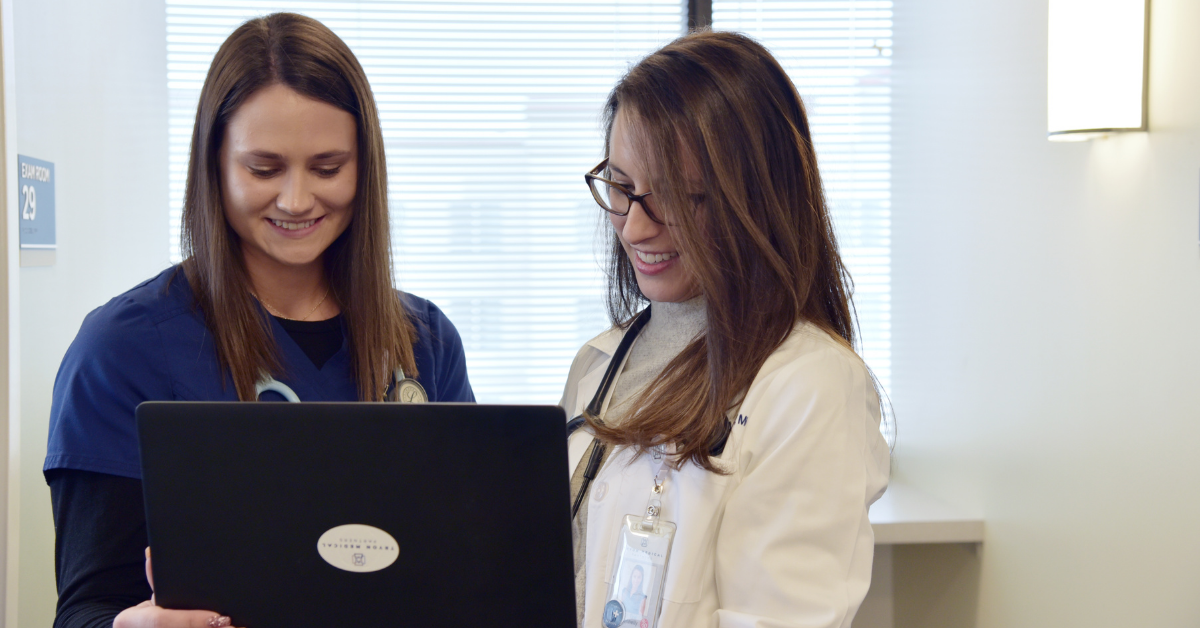
While virtual visit technology was widely available before the pandemic, COVID-19 has made this method of seeing a doctor more commonplace than ever. Not only has it proven helpful for patients who need to be at home, but it has also allowed those who have difficulty reaching the office an opportunity to access the care they need.
Tryon Medical Partners doctors have seen patients who prefer virtual visits for various reasons. While Tryon offices are thoroughly sanitized and optimized for patient safety, patients who are at higher risk for contracting COVID-19 might be reluctant to leave the house. Others are busy parents who are juggling their childrens’ virtual learning and may have a hard time getting away. There are patients with mobility or transportation issues, and some who suffer from depression or anxiety are uncomfortable with office visits. Since Tryon providers can treat patients who are anywhere in North or South Carolina via a virtual appointment, patients who are traveling or college students who are away from home but still prefer seeing their primary care physician are taking advantage of virtual visits.
With the rise in popularity of communications platforms like FaceTime and Zoom, patients of all ages are more comfortable than ever in a virtual world. If you have not yet scheduled a virtual visit of your own and are unsure if it’s right for you, Tryon Medical’s physicians address the most frequently asked questions about this appointment type:
What Kinds of Concerns Can Be Addressed via Virtual Visit?
“For symptoms or problems that do not require examination of a particular area or measurement of specific vital signs, a virtual visit is just as helpful and productive as an in-person visit,” said Dr. Kym Furney, an internal medicine specialist at Tryon Pineville. “It is a period of one-on-one dedicated time with your physician where she can listen to your concerns and come up with a treatment plan together.”
In cases where treatment must be hands-on, an in-person appointment is necessary, like when a physician would need to physically assess pain levels or perform a physical examination. But for many needs, virtual visits work wonderfully.
“Virtual is great for medication follow-ups, for example,” said Dr. Claire Wilder, a primary care physician at Tryon Uptown. “I have patients who are taking antidepressants, anti-anxiety medicine or ADD medications. Most are consistent over time and at our visits, we’re just assuring no adjustments need to be made. It’s a discussion and, for many, virtual is easier.”
During the pandemic, anyone who is concerned they have COVID-19 should start with a virtual visit. Tryon has worked to keep offices thoroughly sanitized for well visits by screening patients and keeping COVID-19 concerns and testing at satellite clinics.
If you’d like to see your doctor and still aren’t sure if virtual or in-person is the best option, Dr. Wilder suggests using Patient Portal to ask your physician and be sure.
Will My Insurance Cover a Virtual Visit?
Over the course of the COVID-19 pandemic, insurance companies have made advances in and changes to their policies, now covering virtual visits in the same way they cover in-person visits.
As you would at an in-person appointment, check to make sure everything is in-network and expect to cover the coinsurance or co-pays your insurance requires.
What if I’m Concerned About Technology and Virtual Visits?
Feeling technology averse? There are ways to take your virtual visit for a test run. Since patients receive the link for their virtual visit at the time of scheduling, that means it’s available to test any time beforehand. Dr. Wilder recommends that her patients log in to try their audio and video a few hours prior to the appointment, so they feel comfortable once the time arrives.
“For patients who may not use technology quite as much, I would encourage them to give it a try as they may decide they really like the convenience,” Dr. Furney said. “Consider having a family member who uses technology more often be there for their first visit to help get started.”
How Else Should I Prepare for My Virtual Visit?
Once you’ve followed recommendations for how to prepare for the technology components of a virtual visit, you’ll prepare for your appointment in the same ways you would an in-person visit. Plan to have your insurance card and copay at the ready. You’ll also want to share information about the medications you’re taking, which can be even simpler with your virtual visit if you’re at home.
At the Office You See a Nurse – How Does that Work Virtually?
At your virtual visit, you won’t check in at the front desk or sit in the waiting room, but you’ll still interact with a nurse or medical assistant as you would at your in-person visit. The same conversations apply about medical history, what medications you’re taking and the concerns that brought you to your current visit.
Can Urgent Care Visits Be Done Virtually?
Tryon does offer Virtual Urgent Care to address immediate needs, including after-hours and weekends. Through a virtual visit, you can make an appointment with your primary care physician who knows you best, while you’ll see the first available provider with a Virtual Urgent Care appointment.
What About Lab Tests?
In many cases, if an appointment requires lab work, that can be scheduled separately at the office, requiring the patient to only come in for a short lab visit.
How Is My Information and Privacy Protected During a Virtual Visit?
Tryon virtual visits are conducted through an encrypted, HIPAA compliant platform to assure your information stays safe and secure.
Can an in-Person Visit Be Changed To a Virtual Visit?
If you would like to change an in-person appointment to virtual, please call your Tryon office prior to the day of your appointment to make the update.
During the COVID-19 pandemic, Tryon doctors and physicians across the country have seen patients neglect their well-care visits and non-COVID concerns, resulting in dangerous outcomes. Now more than ever, rely on your trusted providers to keep you healthy and well. By optimizing our offices for in-person visits and being available for virtual visits and Virtual Urgent Care, your providers are more accessible than ever and focused on building relationships that result in better care.


